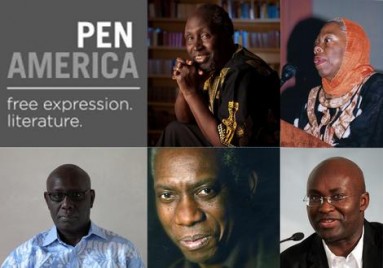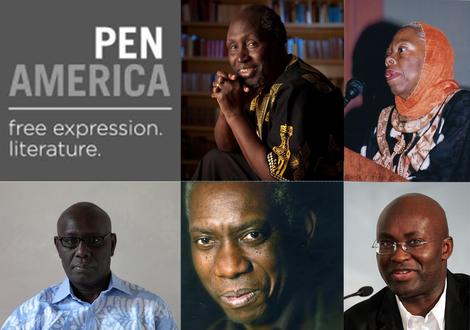The first PEN event I attended last weekend in NYC, was a gathering of the Elders, “the Witnesses,” a group of old men whose collective wisdom we were invited to witness: Boubacar Boris Diop, Yusef Komunyakaa, Achille Mbembe, and Ng?g? Wa Thiong’o.

They were led onto stage, however, and introduced with so much ceremony and praise that there could be no vitality to the event. This was not exactly their fault, not exactly; if you’d already read their work before, you’d probably already heard everything before, a repetition which was what it was. And I’d have paid the price of admission to see any one of them speak, alone: they are each interesting and flawed and vital thinkers, with archives of work that haunt the present, and they aren’t dead yet. They have said so many interesting things, over the years; it can be easy to take someone like Ngugi for granted, because of the way “Decolonizing the Mind” has become a framing conceptual structure for any and all discussion of African literature, even if (especially if) you struggle to disregard it. Seeing them in person, embodied, is the opportunity to see them move and speak and contend with their textual selves: how does Ngugi feel about the English language now? Someone needs to ask him about how it feels to write his memoirs in English, now, an issue that goes strangely un-addressed when people invoke his decision to stop writing in English. Ngugi of the 1980’s haunts the Ngugi of today. I’d like to hear him talk about living in California; I’d be the last person to tell him he should move back to Kenya (or write his memoirs in Gikuyu), but there’s a strange gap between the sense of “What Ngugi would say” that is so often invoked in discussions of African language and literature—permanently crystallized in the early 80’s—and the actual Ngugi wa Thiong’o. The former is an unyielding firebrand who makes uncompromising political demands; the latter is an old guy who makes lots of warm grandfatherly jokes. There is no scandal here; we are all conflicted and contradictory mixed up combinations of different selves, of course. It’s just that some people have a lot of things to say about that fact. Someone should ask them.
Instead, what became apparent almost immediately at “The Witnesses” was that the ceremony with which these Witnesses were to be presented to us, made present, would place and preserve them in a place outside of time and history: the preserved Africa of perpetual tradition. Perhaps that’s what happens when you put four very different thinkers in one place, and ask them to reflect on “What is the value of age and wisdom when it comes to artistic expression?” Perhaps that’s what happens when—before they are given the chance to do—they are placed under the spotlight of “When an Old Man dies, a library is burned” and allowed to do no more than reflect the grisly light of that cliche and other burning ruins. They played along. But because the room was so carefully staged by the aura of their dead genius, the only part they could play was that of ancestor, of dead father. The conveners buried them under the imperative to perform Africa The Traditional.
“Traditional Africa,” whether a real thing or an invented Victorian imposition by British colonialism—and it’s at least a combination of both—is nothing if not patriarchal, as this event scrupulously reflected. There were six people on stage; two of them were women, but if they had ever written anything themselves, it never became apparent: they only talked about the four patriarchs, performing reverence to them, reading their work, praising them, even placing personal copies of their books on the table before them to be signed.
On the one hand, there’s the conversation we could have about why Ama Ata Aidoo or someone like that wasn’t brought to be one of The Witnesses. Granted, there aren’t a lot of Ama Ata Aidoos around (though I know of at least one, and also, Rashidah Ismaili was right there). But also, it’s easier to find male elders to reflect on “the value of age and wisdom when it comes to artistic expression,” if for no better reason than that the generation of Ngugi and Aidoo was segregated by gender in ways the archive of elderly prestige now reflects. It’s also one of the reasons why age, by itself, is not quite the same thing as wisdom: women with age do not reliably turn out to be treated as Wise Elders, while Wise Old Men are often treated as such without needing to reflect it. This is a good conversation to have because, My God, what was even going on on that stage? Worth noting: at the same time as "The Witnesses" were parading patriarchal authorship, the panel on writing gender was happening somewhere else. Men Witness, Women gender....
Anyway, the drama of patriarchy is always interesting, at least, because of the ways it so poorly serves their humanity, and this is another conversation to have. Every word that Ng?g? speaks reminds us of how many years it has been since he wrote Decolonizing the Mind; a day later, the panel on Glissant would reference “what Ng?g? would say” about Glissant’s demand that we try to dirty or language, to soil it and make it impure, because it was never pure anyway. And in that room, Mbembe was able to argue, explicitly, that there has never been a “pure” language, and that Ng?g?’s argument demands a return to something that never existed. But he didn’t say this when he was sitting next to him. “What Ng?g? would say” only became available as a position to refute—a caricature, even—in his absence. Because the best kind of father to kill is the father that’s already dead?
It became clear, at a certain point, that Mbembe was uncomfortably situated between three icons of literary art, a discomfort he did his best to emphasize, perform, and articulate: he was the youngest person on stage, he observed, a moment before suggesting that age does not necessarily confer wisdom. This was an idea which no part of the preceedings would have led one to suspect; every act of framing and presentation led inescapably to the opposite conclusion, that age and wisdom (and masculinity, implicitly) were the same. With a laugh, Ng?g? observed that his son was in the audience, and complained that Mbembe was undermining his authority. Don’t listen to this man, he instructed his son; listen to me. We all laughed. As a joke, it was a charming moment (and Ngugi is at his most charming when he makes jokes, as he often does). Yet that joke held, with a loose grip, the tension of the statement: if Ng?g?’s joke about paternal authority was funny, it was because Mukoma wa Ngugi is is a grown man, and in the absence of true patriarchal authority, when one adult pretends to command another, the laugh expresses love, not anxiety. The pretense of the claim, its pretension, performance, actually marks the relaxed grip with which the father is holding his child. You can laugh, and we did, because it’s only a joke.
Of course, and this is the point, sometimes patriarchs don’t grip their children so loosely. You can be opposed to patriarchy and also be charmed by patriarchs; Ng?g? is charming, such a far cry from the unyielding firebrand who rebukes and disciplines, in his own absence. But only in his absence does “What Ng?g? would say” frame him as a father who must either revered or killed. In his presence, he’s a funny old grandfather who performs love for his son, not only praising the novel his son wrote in English, but failing to rebuke him for contributing to the death of African languages.
Boris Bouboucar Diop spoke movingly, that evening, about Cheik Anta Diop, and suggested that when he and his fellow students were young, they tried to kill the father: Marxists all, they found Cheik Anta Diop’s work inadequate, ill-conceived, something to be cast off. Today, he reflected, decades after his passing, Senegal has realized its error. Having killed the father, perhaps, his absence made them realize the value of his living presence? It wasn’t necessary to be at this event to read Diop's reflections on Diop, of course; his collection of essays, Africa Beyond the Mirror, contains a moving reflection of the Senegalese intellectual class’s two fathers, Cheik Anta Diop and Leopold Sedar Senghor. It’s a tremendously illuminating essay, and I’m glad I read it. But when he quickly, briefly, described the ways the Senegalese intellectuals of today were un-killing the father in their memory, he animated knowledge I had been glad to read and gave it emotional weight, substance, presence. Mourning the father makes his presence felt in ways the mere figure in the room never could, nor should. But give me the latter, any day.
